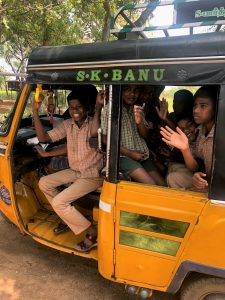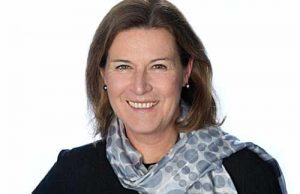Interview with “Patengemeinschaft für Kinder in Indien e.V.”, a German association, TRC supports and sponsors for many years.
What is behind the Patengemeinschaft?
The Patengemeinschaft is a German non-profit association, which runs various aid projects in South India. We are recognized as a charitable organization and are therefore entitled to issue donation receipts. Every year, our foundation voluntarily undergoes an independent audit by the German Central Institute for Social Issues (DZI) and have been awarded the DZI donation seal for many years as a sign of trustworthiness. The association is party-politically neutral, non-denominational and not bound to any sponsor, institution, or organization. The board of directors works on a voluntary basis, so that their administrative costs are regularly only between approx. 3% and 6%.
How and where does the Patengemeinschaft help?
Since the beginning of the foundation, we have been active in the south of India, in the states of Kerala and Tamil Nadu. Much has changed for the better since we began our involvement in the late 1960s. India is an emerging country with 1.3 billion inhabitants! One third of the population is now under 15 years old, and the average age is just 26! The economy in the country is booming – but this progress is not reaching a large part of the population. That is why our work there is very meaningful.
Who does the Patengemeinschaft support?
Today, our commitment still primarily serves targeted individual help through child and family sponsorships. Increasingly, our association is involved in supporting young people who want to complete an education or study and ask us for help because their families have no financial means to pay for the education. Without education, young people in India have hardly any chance to start a self-determined life without poverty. We provide help for self-help: the families and children are supported until their precarious economic situation has improved or the education is completed.
Orphanages: The Patengemeinschaft runs 10 of its own children’s homes and supports 10 orphanages run by others. Only when the children cannot stay with their families, do we take the children into the orphanages, as the need is too great, or the circumstances are too precarious. This has to be approved by the local social authorities, with whom we maintain good contact. Our orphanages are of an above-average standard and the children here receive comprehensive and loving care. The children have a regular daily routine, receive healthy meals, medical care and, most importantly, they attend school regularly. All children in these homes successfully complete school after either the 10th grade or the 12th grade. With only 30€ per month, a child can be comprehensively cared for here.
Family assistance: Many children remain in their families – mostly single mothers – and do not go to a children’s home. They are directly supported by our sponsors within the framework of family assistance. Often these small families live in incredibly poor accommodations. Nevertheless, the mothers try everything to send their children to school, to feed and clothe them. Through the reliable, financial support of the sponsors, the vicious circle of poverty is broken, and the families can lead a modest life in dignity.
A small contribution – by our standards – can provide lasting help.
Before being accepted into the aid program, the families are always being visited at home. The visits to the huts and homes of the families give a direct, very real insight into the circumstances in which the poor part of the Indian population lives. With only 35€ per month, a single mother with one child can make a modest living and send her child to school regularly. For each additional child, we ask for an additional 5€.
Education assistance: Our assistance program for young people in education is growing steadily. In most cases, loyal sponsors continue to accompany children through their education after graduation, but we are also receiving more and more requests for educational assistance from outside sources. With continuous and reliable help, the young people can complete their studies or training and start a successful life. Otherwise, they would have to take a job right after school to support the family. Without a vocational qualification, the young people have no chance in the already highly competitive job market in India. You can either take over a personal sponsorship or help with a regular or one-time contribution to our education fund.
With a regular contribution – starting at 25€ per month – a young person can complete an apprenticeship or study.
Undesignated donations: These donations allow us to respond to emergencies and maintain our facilities at a high level. Funds are also often needed for extraordinary personnel expenses, such as tutoring for the children.
How and when did the Patengemeinschaft come into being?
Adolf Klein, born in 1914 in Sahms/Schleswig-Holstein, Germany, grew up in simple circumstances and worked there as a mailman. He was a simple but kind-hearted man who only went to school until the 4th grade. In the 2nd World War he lost an arm and saw a lot of misery. He had great compassion, especially for children. After the war, he took 11 orphans into his family. He heard about even greater misery of the poor population in India, where naked poverty and hunger prevailed. In 1964 he traveled to India for the first time and the Patengemeinschaft began with the acceptance of “Anthony” from the YMCA home in Madras, now Chennai – our first sponsored child. During this time – 1969 – the “Patengemeinschaft für hungernde Kinder e.V.” was officially founded in Sahms. In 1991, he traveled to India for the last time. In 1994 Adolf Klein passed away. In 2019, we celebrated our 50th anniversary together with our Indian colleagues. It was a happy get-together with many sponsors and friends.
How does the Patengemeinschaft work? How do the funds reach the people in India?
We maintain an office in southern India. We have been working closely and in a spirit of trust with our colleagues there for many years. They take care of the administration and all matters in the homes and the families through two state-registered associations, which are closely linked to the association through our statutes. Both associations are subject to the control of the Indian social authorities. At least once a year the chairwoman of the board or another member of the board travels to India and visits the homes, families and young people, as well as our projects.
We regularly transfer the sponsorship contributions and support for the projects to India. Our colleagues on site take care of the proper use. During the visits of the board in India, the money movements and expenditures are controlled once again. The donations are directly transferred to the bank accounts of the families, homes and young people.
Why does it make sense to get involved with the Patengemeinschaft?
We work on a very personal level. The chairwoman or other members of the board travel to India at least once a year and visit the homes, the other institutions and many families and young people in education. We know “our” children and the country with all its problems because we are personally there. We are in constant contact with our colleagues in the Indian office. Furthermore, we hear firsthand what moves the people here and what issues they have. And this has been going very well for over 50 years! In an increasingly globalized world with political “block formation”, cooperation with India, the “largest democracy” in the world, is the right option. Even if not everything is up to European standards.
With our budget, we move a lot. We have many loyal and reliable sponsors who make our work in India possible, and we are not dependent on a few big sponsors. Our financial statements are available on our homepage. The contact between the sponsor and the sponsored child/family is consciously encouraged by us. Once a year, the sponsor receives a personal letter from the sponsored child/family. A visit is also possible by arrangement.
What are the plans of the Patengemeinschaft for the future?
We will continue with the areas in which we have been successful for many years. For some time now, we have focused on supporting young people, who are the future of India, and this area will continue to grow. There is no pension system or comprehensive social safety net in India. Through a kind of intergenerational contract that reflects Indian family culture, children take care of their parents in old age; people live under one roof. In this context, a good education for young people is even more important than it is here.
How to reach us?
You can get a lot of information from our homepage: www.patengemeinschaft.de
This is our donation account: Deutsche Kreditbank AG, IBAN DE66 1203 0000 1001 1888 10.
We are happy to answer your questions personally, also in English.
You can reach us by email: info@patengemeinschaft.de or also by phone: 040/866 24 884.
I look forward to hearing from you.
Best regards!


